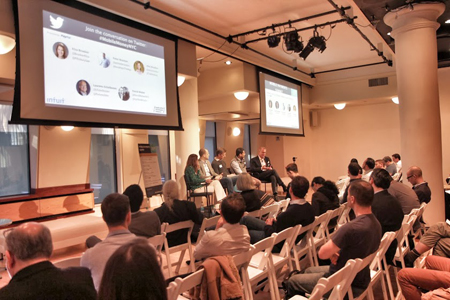If you want your event to be a success you simply have to get the meeting venue right. Your attendees will not put up with a poor location, difficult transport or parking and sub-standard technology, regardless of how awesome the event is. Similarly, it will be hard for you to tolerate an amazing event space if the venue staff is non-responsive and lacking in amenities provided. The decisions do not end there. You need to take into account who your specific attendees are, from how far away they might be travelling and how many you are expecting. If you choose a venue that’s too big then your meeting can come across as under-performing, even if turnout is better than expected. Go too small and your attendees will feel uncomfortable and squished. When choosing the venue for your next meeting or conference there is always more to consider than just the budget.
So how do you go about choosing the right venue for your corporate conference or meeting? Below is an excerpt from our eBook, “30 Features an Event Space Should Have in New York City.”
Do not be afraid to ask the following about any potential meeting venue:
1. Location/Accessibility Is the venue in a neighborhood where people will feel comfortable, both safety and atmosphere-wise? Is the venue easily accessible to those attending? Does the location offer the necessary road/rail/air links? Are there places around the venue where guests can take some time to relax or sightsee after the meeting – e.g. restaurants, parks, galleries, landmarks, and other attractions?
2. Technology Does the venue offer wired/wireless, dedicated Wi-Fi sufficient for your meeting needs? Does the venue have in-house A/V equipment including microphones, projectors, speakers, extra computers, and sufficient electrical outlets? Is the venue set-up to live-stream events? Does the venue have a dedicated A/V technician who is familiar with the space and the equipment? Ensuring your event has adequate technology and experienced technicians is extremely important to avoid unwanted disruptions in the flow of your event such as Wi-Fi outages, microphones not working, and issues with projection. Finding out what is included will also determine additional costs for having the correct event tech.
3. Venue Staff Do you have a good feeling when speaking to the staff? Can they answer your questions well and understand or anticipate your needs? Is the staff helpful and knowledgeable even before you’ve booked your event with them? Is the staff willing to make reasonable accommodations? It is crucial to not overlook this as one of the most important elements in choosing a venue, as these are the people you will be working with before, during and after your event.
4. Turn-key Solutions Often just planning speakers and an agenda for your meeting or conference can be overwhelming. Check to make sure that the venue offers amenities and turn-key solutions based on your needs. These may include food and beverage service, staffing, providing rentals or furniture onsite, kitchen space, a/v tech and lighting, etc. Note that some venues will be more inclusive than others. It’s always good to ask the venue to send a comprehensive list of what’s included with the venue rental as there may be more than shows on the estimate.
5. Branding Opportunities Is there street-level signage? How much of the venue can you brand, both inside and out? Can you create an immersive brand experience inside the venue? Does the venue allow you to hang items and post on walls, floor, etc.? How easy is it? Is there a ceiling grid for you to use?
If you have never used the meeting venue that you are considering before, you should take a look at their past client list or ask for a list of their clients, in your specific industry. Always visit the venue personally, if you can, to get an accurate impression of the layout and, very importantly, the attitude of the staff.
The meeting venue you select should help you get the most out of your meeting by adding to the experience of those attending. So take the time to choose carefully. Are you ready to learn more about additional features an event space in New York City should have?












